Ellen and Jim Have a Blog, Too
We are two part-time academics. Ellen teaches in the English department and Jim in the IT program at George Mason University.


Pallisers 8:15: Mid-point: remembering how they were (2) · 2 October 08
Dear Friends,
We’ve seen how the gravitas of 8:15 matches the satire on politics in Phineas Redux: Trollope’s disillusionments in private life and his bitter disappointed experiences in his campaign at Beverley are translated into domestic loss, narrowing of hopes, distress, frustration for Phineas (Donal McCann), the Kennedys (Anna Massey and Derek Godfrey), Marie (Barbara Murray), Lady Hartletop (Doris Rogers), resolved resignation on the part of the Pallisers (Susan Hampshire and Philip Latham) as a pair. We also have through Raven’s recasting of Trollope’s text the Duke’s death facing nothingness. Raven’s use of Shakespeare’s lines from Henry IV, Part 2 seemed to me perfect for Shakespeare’s are not a religious man’s plays.
This time I will have two blogs of concise summary, pictures, with comments on dramatization and themes.
To begin with Xmas as 8:15 does makes for effective contrast. I suspect Raven felt about Xmas the way Trollope (and Wilkie Collins did), mostly meretricious hypocrisy. I noticed too the palate has returned to black and greys, dark rooms (as in 2:3 and 2:4). This is appropriate as the Duke is dying and dies, but the black and greys are in all the scenes. We move into very early spring (so the film is done with care as this season is perfect for the mood) for the Duke’s funeral.
The summary:
Episode 31: “Christmas Visit:” Scene 1) Kennedy’s room at McPherson hotel, London. Raven dramatizes Phineas Redux, Vol 1, Ch 10, pp. 87-90 (I use the Oxford PR, 1983 ed., intro. F. Lyons). This scene is a continuation scene from 7:14, the club where Phineas showed Barrington Erle (Moray Watson) Kennedy’s letter and revealed he had had a letter from Laura; Erle refused to understand Phineas’s desire to do the decent thing and visit Laura.
Driven by Slide’s threat to publish Kennedy’s poisonous letter, Phineas attempts to reason with Kennedy but there is no reasoning with a man so bitter and without any other resource than harsh calvinistic religion. As in Phineas Redux Kennedy forbids Phineas to go; Raven adds rough modern language (instead of calling Laura a “castaway” Kennedy calls Phineas “accurst among adulterers”). Nonetheless, Raven makes us sympathize with Kennedy in a way Trollope does not, for Kennedy has Laura’s picture near him always and he is crying out of loneliness too that he wants her back:
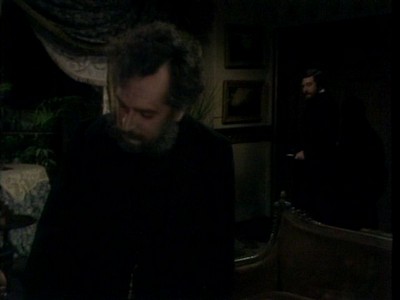
Kennedy (Derek Godfrey) grieves for the loss of (in effect) his life
I suggest we are intended to remember Kennedy as an apparently urban man who spoke of the danger of being too much alone, whom we first saw in the sunshine on top of Loughlinter in 4:7.
The scene concludes with Kennedy leaning on the mantelpiece near the picture, rasping out: “Tell her that her home is with me (a deep resonant voice) and that I am awaiting her.” It is all despair.
Scene 2) Dresden, Laura and her father’s home, front room, with Christmas tree. From Phineas Redux, Vol 1, Ch 11, pp. 94-98, dramatized and transposed. Laura rushes out from behind the tree in her intense eagerness; and he stands there smiling, so glad to see her again. The pair of shots is very touching:
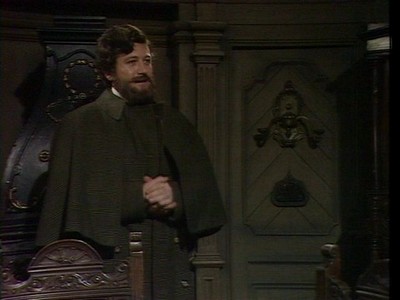
Phineas so glad to see Laura after all these years
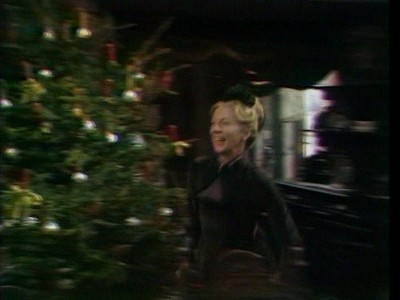
Laura so eager to re-see Phineas once again
I suggest we are also intended to remember how they were in 3:6 when we first saw them together and again at Lochlinter in 4:7. Lady Laura is now poignantly done by Anna Massey—all in blacks or greys, no make-up, all open face, all love for Phineas, and all regret. Phineas does become embarrassed at Laura’s “no ceremony” and joy; we see them go behind the tree and sounds fade away.
Scene 3) Matching Priory, entrance and front room. Lady Glen coming in with Christmas wreath; this is to give and Marie something to do while they discuss Plantagenet’s disappointment. It’s assumed that its comedy for the audience that only Lady Glen even listened to Plantagenet’s long-planned hard-studied 2 and 3/4 hour speech on decimal coinage:
Marie: “He must have been very disappointed at the reception.”
Lady Glen: (coming down from trimming the picture): “Well he said nothing, but he looked quite tragic. Still when we got him home at 11, he ate 3 oysters, drank a glass of beer and slept all night.”
They laugh.
Marie: “So he was not inconsolable?”
Lady Glen: “No but now he is fussing because he says the real work will come when he … yes Collingwood …”
And so it goes off. In Phineas Redux and other novels Trollope has men get up to make sincere learned speeches about improvements and progress, and the members flee; Trollope half-mocks them.
Then we move onto Lady Hartletop’s (Doris Rogers) disappointment which turns into real distress. This comes from Chapter 25, pp. 224-25. She wants to see the Duke one last time and he will not see her, though he will Marie. We see Lady Glencora stoutly defend Marie as her “most intimate friend.” The scene begins with comedy, lack of sympathy for an old woman who is indignant another woman who is lower in status and not related (Marie) is let in; but it ends in sympathy when Lady Hartletop’s grief comes out as she begins to cry.
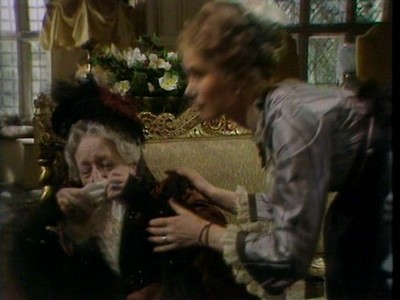
Lady Glen comforts the genuinely distressed Lady Hartletop
The Duke’s refusal to see this woman is used and brought back in the next scene as indicative of how people are capable of treating a past and memory meaningful to others but not to them.
Scene 4) Matching Priory, Duke’s bedroom.
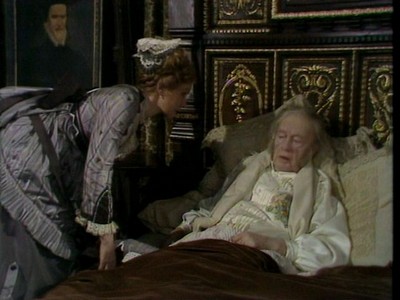
Lady Glen leaning over, urging the Duke (Roland Culver) to see Lady Hartletop (a parallel shot)
He will not listen to the assertion Lady Hartletop has come out of affection for him, for, well, memories of love. Implicit is the suggestion that he won’t see Lady Hartletop because she’s old and ugly. The Duke half-remembers line from Henry IV, Part 2, where Hal rejects Falstaff: “Tell her, ‘Make less thy body hence and more thy grace .. Heh heh.” He laughs and says can’t remember “how it started,” and asks them. They look grave and he insists: “Well, come on, one of you. You’re all so young and clever. How did it start.”
Marie moves over to head of bed and that reveals Palliser standing there. It falls to him as male to say the words are ironically appropriate for this idle duke (so Marie’s later words from Trollope become reinforcement): “I know there not old man. Fall to thy prayers. How ill white hairs become a fool and jester …” The Duke does not see this fits him.
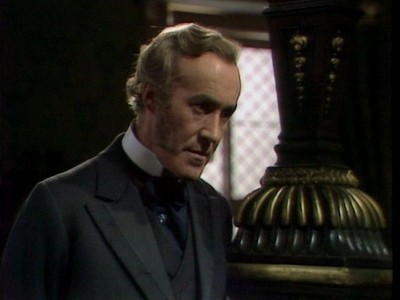
Pallisers (Philip Latham) steely moment before the Duke, quotes Henry 4, Part 2
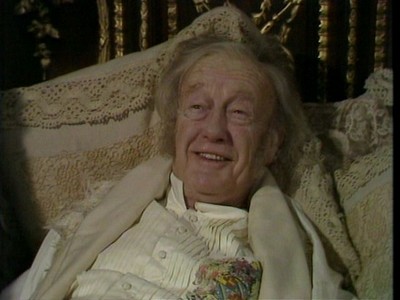
The Duke’s fatuity
Episode 32: “Lost Love:” Scene 5) Dresden, front room where Phineas, Laura and Lord Brentford (Lockwood West) are having breakfast (the next morning after previous scene). The scene is also made moving because Lord Brentford cannot understand—as in Trollope the money and convention matter to Brentford enormously. He thinks Laura could and should go back and secure the return of 40,000 pounds. Phineas insists that Kennedy is “crazed with religion,” Kennedy’s “parsimony intolerable,” and it would not be safe, and would be a place of utter misery for Laura. Brentford: “That is a grave thing to say Mr Finn”, and Phineas in reply: “And it is gravely said, my Lord.”
Lord Brentford is also one of the disappointed and cast aside. As in Trollope he longs to return and dreams he can. Raven has him quote Othello: “I have done them some service in my time,” and Finn, “Oh indeed, my Lord, and they know it” (Othello utters both statements.) Laura interrupts with her woes, and Brentford objects irritatedly that they are now talking about him (not her).
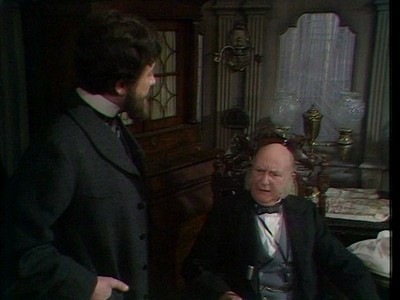
Brentford sour because he has ended up discarded
The mores in this 1974 film are not for women’s freedom: Laura berates herself for having married a man she never loved so she could get his money and share his power (this is very like what Jeanine Basinger says one finds in US movies from the 1930s to 60s, see A Woman’s View: How Hollywood Spoke to Women….). However, this is a change from Trollope where the narrator remembers for Laura that she married Kennedy after she paid off Chiltern’s estates, so in effect Violet Effingham’s security was paid for by Lady Laura’s sacrifice (reminding me of Sense and Sensibility where the happy ending is dependent on the two fallen women used to bring the estate into that branch of the Brandon family). Finn’s face is one of real grief and stress for Laura: he has become the good man in a hard life where so many suffer. We are to believe Laura had convinced Phineas she did respect Kennedy but actually didn’t. (In the novel Phineas Finn he scarcely credits this.) We recall some close-ups from the earlier parts which revealed Laura’s determination. Again, in the book at the time she did think she might or could love Kennedy; in Trollope Lady Laura was not as as ruthless and calculating as Raven’s Lady Laura describes herself.
So Raven makes Lady Laura worse or more at fault (for ambition) & he makes Kennedy more sympathetic than Trollope does. McCann conveys a strong awareness that he no longer loves Laura, to which Massey replies with lines taken from Vol 1, Chapter 12, p. 107, e.g., “I will kill it [love] out of my heart even though I should crucify my body.” Phineas tells her “I wish I could show you some hope.” And we get how she will live vicariously through him (see Vol 1, Ch 12, PR, p. 107). After series of triangulation close-ups the camera moves out to rest on them lightly for a second or so. Very moving moment as he holds her hand tighter.
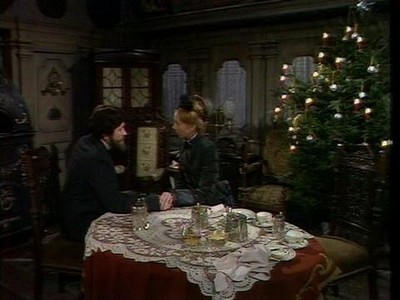
Scene 6) Palliser drawing room, London; we’ve seen this room before, when in 2:4 Alice and Mr Bott dined with the Pallisers and Plantagenet rose to the occasion and behaved with courtesy and generosity to Alice (Lady Glen’s respect for this). Now we see him again with sycophantic politicians (Bonteen refers to disestablishment as “our pigeon”). This scene is intended to substitute for long chapters in Trollope about Daubeny’s attempt to use disestablishment of the church to stay in power (including speeches (Vol 1, Ch 33, The Two Gladiators). In this scene Bonteen gratuitously tries to insinuate Finn will be one of those who jumps from their boat, and Palliser suggests he can “afford to be kind” in his “assessment” and that Finn won’t be alone. The scene ends with Palliser giving Bonteen and Erle a paper as part of their task. A list of names?
Episode 33: “Kennedy’s Letter:” Scene 7) The club. Opens on Barrington Erle warning Phineas if he votes his conscience, he will never more get office from the party, and brings out his jealousy of Phineas’s attraction for women: we have not seen this since 4:8 and it is not in the book. Bonteen as side-kick adds an insinuating crack about Phineas’s visit to Laura at Christmas. By contrast, in Phineas Redux while Barrington is not sympathetic and cannot understand Phineas’s point of view, Erle feels remorse because he asked Phineas to come in the first place so Erle makes no such direct threats.
Exigencies of TV drama? The confrontation between Slide and Phineas over Kennedy’s vicious letter, from Ch 22, pp. 197-203. The most moving moment in Raven’s version is provided by the actor McCann’s sense of ironic sorrow about the switch of the paper from Whig/Liberal to Conservative/Tory, delivering a line not in Trollope: “And so you have been able to reverse your own beliefs accordingly, hmmm?”
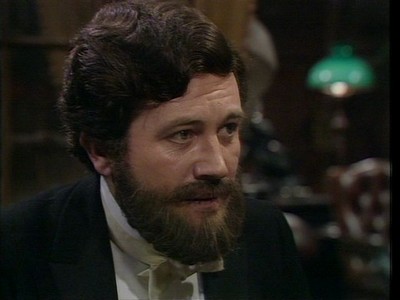
Phineas looks at Slide and says ah, it doesn’t bother you to change your opinion
Dramatically, the sequence of Phineas receiving this letter from an unscrupulous hypocriter (Slide) and his visit to Kennedy and the ensuing violence (see below) are done very like the sequence in 3:5 where George Vavasour visits John Grey after conferring with an unscrupulous hypocrite (Mr Scruby). The follow up to this blackmail scene in Phineas’s visit to Kennedy is very like George Vavasour’s visit to John Grey after Grey confers with Mr Vavasour. George and Mr Scruby are analogous to Phineas and Mr Slide.
It’s in this scene Phineas is spied by Dolly Longstaffe (Donald Pickering). Phineas sees Palliser conferring with others, Erle, Bonteen (Peter Sallis); he is still the outsider, and threatened by the companionship of Slide. Instead of ideological or philosophical argument he can show in ordinary language the moral hypocrisies of the public realm and public, Raven conveys something of Trollope’s bitter political themes through this long scene.
Scene 8) Portray Castle, Sunday, Emilius (Anthony Ainley) and Lizzie (Sarah Badel) sleeping. This is the one scene from this marriage (cf. thus far, the Pallisers’, the Kennedy’s Phineas and Mary’s); the last one, 7:14 showed Lizzie succumbing to sexual seduction (from Eustace Diamonds, Ch 79). Since we are again at a sex scene, the implication is they are a base couple. In 7:13, there is but one non-Eustace Diamonds scene from Phineas matter; it’s an invented scene this other marriage, one of strain amid good intentions in the marriage as Phineas has been trying to do good work and Mary Finn is ill from pregnancy and filled with high delusions. So here we have one scene from Eustace Diamonds matter brought forward into Phineas Redux to provide a murderer for the new novel.
The scene is a dramatization of what is implied in passing in PR, Vol 2, Ch 45 (“Some passages in the life of Mr Emilius,” p. 40). Instead of Andy Gowran throwing Mr Emilius out we have Mr Emilius insisting on and gaining his conjugal rights, all the while intending not to work any more than he has to and milk Lizzie’s fortune. This is a parallel with Kennedy: he too insists on conjugal rights: a religious tyrannical bigot is juxtaposed to a religious hypocrite . It also follows on Slide’s insistence on “purity of morals.” Raven is asking what makes marriage moral? (In Fielding Grey he asks why homosexual sex is forbidden when heterosexual sex is just as corrupt, craven, and shows how gay men may be blackmailed at any time—so the sympathy for Finn has roots in Raven’s autobiography too, even if Raven is mor sympathetic to Kennedy than Trollope.)
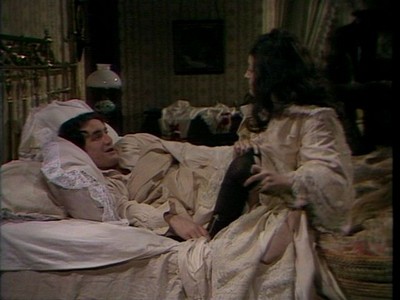
Here we see Emilius pulling at Lizzie’s stocking and leg, a lively scene, but
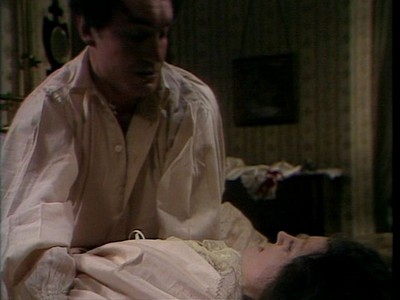
Emilius forcing Lizzie down in order to have sex with her
This second still more gets across the idea of marital rape; but for Burgo Fitzgerald and his aunt’s, Lady Monk’s play over the necklace and money he needs from her (2:3), this is the most daring scene sexually in the series thus far.
Scene 9) McPherson’s Hotel. From PR, Vol 1, Ch 23, pp. 203-08. A powerful confrontation with Kennedy. Again as with confrontations with Lord Chiltern, Phineas is trying not to hurt the man, is trying not to enrage, and only defends, does not attack:
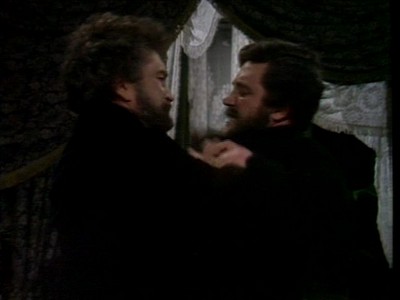
Phineas fighting off Kennedy
So this is another parallel about Phineas’s character with what occurred earlier in the series. As in 5:10 the part opens on a violent confrontation between Chiltern and Phineas over a woman, so this episode does open with a potentially violent one between Kennedy and Phineas, and at its end Kennedy is fingering his poker (as males do in other of Trollope’s novels, an obvious weapon to hand), and we reach (as the series also always holds back and spins out) the violence here, mid-way. In Raven’s scene Phineas is defending himself, and realistically brings out how he has come because the letter “contains a gross libel against myself.” By contrast, Trollope has Phineas almost hysterical (and bursts out in laughter when with Low in the next scene, p. 210) at this low mean man, and makes Kennedy far more crazed (he falls to “low, mean, bargaining whisper” when accused of wanting vengeance).
Scene 10) The Club. Raven must change the characters in Vol 1, Ch 23, pp. 209-12 since he has eliminated Low. We see Dolly (Donald Pickering) trying to get through a Sunday and Monk (Bryan Pringle) watching him over his newspaper:
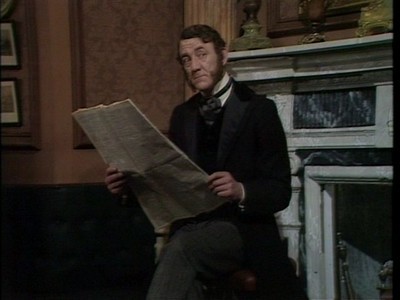
Monk watches the restless bored Dolly getting through Sunday
There’s a visual joke as Dolly gets a paper for himself by lifting one off a sleeping man. In a comment to my first blog on 8:15, Nick suggested that Raven had changed a non-Christian and stoic death into the death of an atheist by changes in words; so here we have two people bored and not going to church because (as Dolly says and Monk does not refute it): they “can’t get up any interest in it.” Phineas rushes in to plead intensely emotionally with Monk to help him prevent the publication of this letter. Dolly is there to undercut the moment:
Dolly: “Really my dear chaps (hand gesture of deprecation).”
Phineas: (Oblivious of Dolly). “Your man said you might be here. Monk, Kennedy has shot me!”
Dolly: “I can’t see the hole, my dear fellow.”
Phineas: “He missed …”
Like Trollope (who uses the narrator’s ironic discourse for this), Raven shows how these people’s privileges (which they assume) enable them to act effectively. Like Law, Monk first gets Phineas to “calm down, and it is funny how this liberal/leftist/radical politician when asked by Phineas, “but … but … will he [the Vice Chancellor] receive us …”, says “Of course. I fagged for him at Rugby.”
The last two episodes are almost dominated by the Duke’s death; a very few pages in Phineas Redux is expanded to make these episodes remember backwards to all we have experienced of the Palliser marriage, and we are show imagery which will be found again at Lady Glen’s death. Madame Max is also brought out strongly; what is left implicit is developed and made explicit and she becomes a sentimental figure as she is not in Trollope. These two become a unit in themselves. So I break the blog here to make a separate blog for these two episodes.
Ellen
See various links and a concise summary of 1:1-3:6, 4:7, 4:8, 5:9, 5:10, 6:11, 6:12, 7:13, and 7:14.
--
Posted by: Ellen
* * *
Comment
- P.S. It’s notable that Trollope's Chiltern hunting sequences (which in the novel play an important role in bringing Phineas and Madame Max together) are only brought up by Raven tangentially as allusions in the Duke’s dying scenes and as the place Phineas went to when he first returned to England.
Trollope's portrait of Chiltern as a master of the hunt is brilliant. In a way he’s Trollope’s Candide: he's cultivating his garden, it just happens to be a hunt so he gets a house and place to live and place in his community where he’s useful. Violet was in Phineas Finn a sceptical disillusioned strong woman and she retreats with Chltern (not in these Palliser films where she’s simplified and made erotic and innocent, someone with illusions).
Similarly, Trollope’s Adelaide Palliser & Gerard Maule story is held off until later as the central pairs here are the Duke and Duchess and Phineas and Marie.
In Trollope by the time of Kennedy’s attempt on Phineas’s life, the Adelaide Palliser story is well on its way (Chs 13-17), & strong & fascinating. The film adaptation into a fragment which comes later is a crude caricature, probably because they leave that horror of a father out, diminish the strength and intelligence of Adelaide.
In Phineas Redux Adelaide’s response to Spooner (eliminated altogether by Raven) seem to me accurate enough: I too have been startled by proposals (not necessarily marriage, but sex) when someone I had no expectation could ask me suddenly began to court or flirt or “chat me up” as it’s said, and three times laughed in nervous reaction (or a sense of how ridiculous one person who mistook me for a prostitute because I was walking on 8th avenue on my way to the Graduate Center then), in all cases the crucial element was I just never expected this person to come on (one was a woman and I have no lesbian leanings whatsoever). A fourth was poignant: a young black man and his sudden coming on taught me a good lesson about my own racism, and I apologized but the revelation had been made. Painful comedy in life. Not that I feel for Spooner—I’m with Ned.
Trollope's subplot has some charming Henry James matter; to wit, the story of Adelaide’s relatives in Florence: Mrs Atterbury with her salon life and real interests in Italian politics, meetings with Cavour and Garibaldi (who we are told she teaches about the Italian scene—Trollope has a joke here about Garibaldi’s lack of upper class connections, just the group he needed to understand were he to have taken power), her life with her husband.
E.M.
— Elinor Oct 2, 2:59pm #
commenting closed for this article
